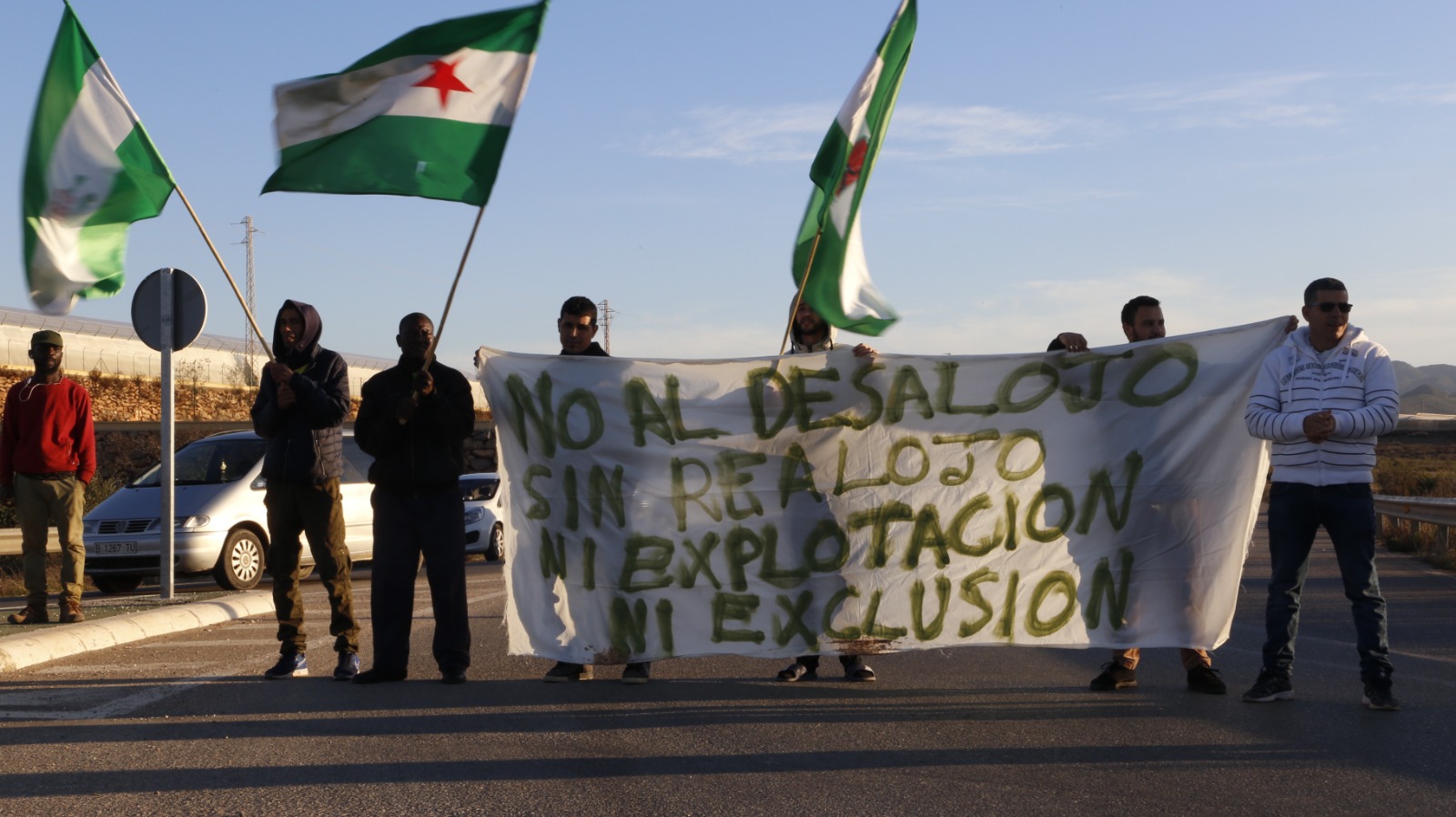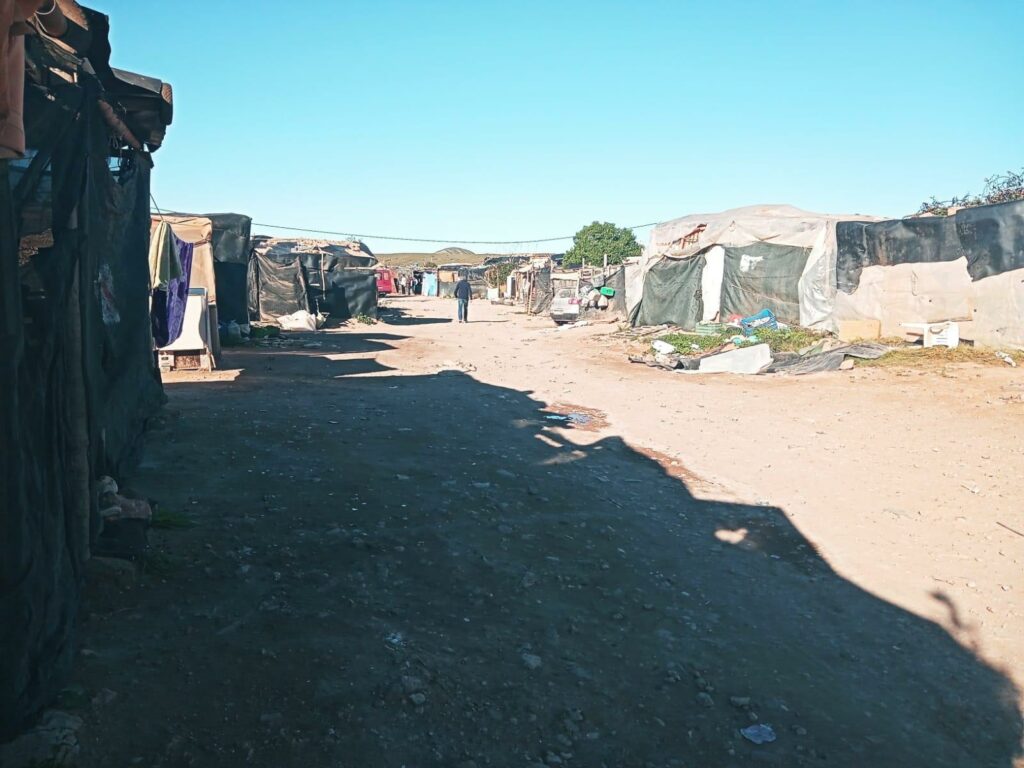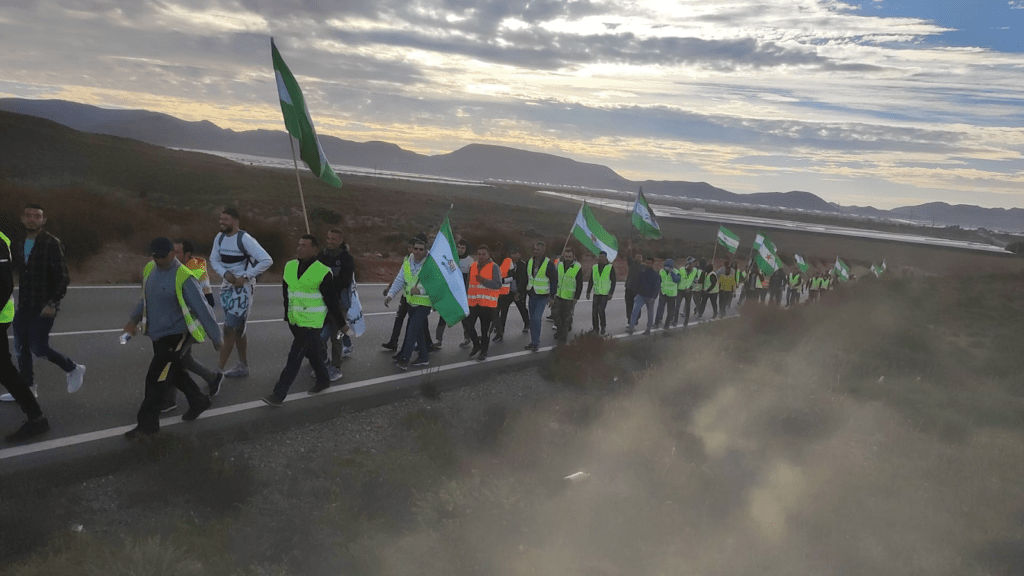Call to Support Migrant Workers Threatened With Eviction in El Walili (Níjar, Spain)

January 25, 2023
Migrant agricultural workers in Nijar (Almeria, Spain) are facing eviction from the El Walili camp, as local authorities have set a demolition date for January 30th. We are calling on our members and supporters to take action to defend these workers and their right to safe and secure accommodation.
Spain is responsible for supplying around a quarter of the UK’s fresh produce imports, as well as 32 per cent of all the vegetables and 20 per cent of all the fruit sold in the country. Much of this imported produce comes from Almeria, Andalucía, famous for its “sea of plastic” concentration of greenhouses.
The volume of produce from Almeria reaching the UK is growing, with Britain displacing France as the second destination for exports in 2021. Nijar is a municipality on the outskirts of Almería in Southern Spain. It is a centre of agricultural production, especially organic. Níjar is home to some 2,000 of the 4,400 hectares of organic production in the province of Almería and is the location of many big exporting companies such as Bio Sabor, Haciendas Bio, Biosol, and SAT Costas de Níjar. Nijar is currently the site of a struggle between the worker residents of the El Wallili shanty town, and the local council, which intends to demolish the homes of 500 people without offering workers alternative accommodation.
Growing production and growing misery
Agricultural production in the Almeria region is only possible thanks to the work of immigrants from Morocco, sub-Saharan Africa and Eastern Europe. They represent 90% of the 120,000 personnel working in the greenhouses. Low wages, intermittent employment and precariousness mean that many agricultural workers cannot find housing that is commensurate with their financial means and must live in the “chabolas”, shanty towns made of plastic pallets and tarpaulins where several thousand people live in total. This figure is constantly rising, as is the value of exports from the agricultural companies in which these people work: over 3 billion euros worth of produce was exported from Almeria last year.
But these shacks are always under threat of being burnt down by the authorities or companies, who consider that they give a bad image of Almeria. The former manager of the employers’ association COEXPHAL, Juan Colomina, states that “the shacks generate a very bad image for us in the European market, with consumers who are very sensitive to the issue”.
El Wallili
El Wallili is the biggest chabola in the municipality of Níjar, with more than 500 people living there. Most residents are migrant farmworkers. It was established 15 years ago and is located in a strategic site between the greenhouses where they work. The local government provides El Wallili with no means of transportation, no water, no electricity, and no garbage collection. An agreement signed in 2000 between the local authorities, unions, and agribusinesses which committed these bodies to the construction of decent housing has never been fulfilled.

Living conditions in El Wallili
Demolition of El Wallili planned with no alternative offer
In November 2022, the municipal government of Nijar began the administrative process of demolition the El Wallili chabola, with no alternative accommodation being offered. This was escalated on Thursday 19th January with notice of demolition being given by the council, and delivered by the Local Police, for 30th January. In public statement, the Mayor of Nijar Esperenza Perez has stated this demolition is due to the terrible living conditions for residents. But in other statements, she has echoed the fruit and vegetable and tourism employers, who allege that the chabolas harm the brand of their products and services, as a reason for the demolition.
To resist this act, 9 unions and social movements have formed the Derecho a Techo (Right to a Roof) coalition. Right to a Roof demands that no demolition take place without the construction of decent alternative accommodation first, and have supporting the residents’ struggle against the eviction through demonstrations, strike actions, and road blockades.

Demonstration of residents against the demolition
In the meeting held between the Nijar municipality and the Right to a Roof Platform on January 12, the Mayoress of Nijar Esperenza Perez guaranteed the rehousing of all the residents of El Walili before doing the eviction. However, the only communication that the inhabitants of this settlement have had has been that of the eviction. Likewise, at the meeting she gave January 30 as the deadline for communication from the City Council about alternative accommodation. However, that is now the date of the demolition. 60 temporary homes are under construction in Los Grillos, but these are without electricity or sanitation and will not be able to house all of El Wallili’s residents. Without attacking the root of the issue, the lack of decent accommodation for workers, the demolition will only result in workers moving to other chabolas, and further hardship for Almeria’s working population.
Support the fight for “El Wallili”
The Landworkers Alliance, together with other organisations of La Via Campesina, supports the struggle of the inhabitants of the settlement “El Wallili” and the Right to a Roof Platform. The Landworkers’ Alliance asks the authorities of Níjar and Andalusia, the agribusinesses, and Coexphal, the representative of the exporters, to respect the workers who make it possible to produce and export the agricultural products that enrich the entrepreneurs of the region of Níjar and to renounce the demolition – as long as there is no alternative accommodation – and to agree to negotiate with the Platform on this matter.
The Landworkers’ Alliance will inform the British public about the situation in El Wallili as long as no solution has been found to provide decent housing for all inhabitants of El Wallili. As residents of a country which imports vast quantities of produce from Almeria, it is important that we communicate to the authorities in Nijar that their attempt to prettify the image of agroindustry by disappearing its social consequences will not work.
Various organizations, including La Via Campesina affiliates in Europe and Morocco, have contacted the Office of the Andalusian Ombudsman to protest the inhabitants of El Walili. After learning of this situation, the Ombudsman’s decision has been to initiate a complaint file with the Níjar City Council.
We urge our members and supporters to write emails to express their indignation. A model text is can be found here. The email addresses for the relevant authorities is as follow:
- Mayor’s Office of Níjar: alcaldia@nijar.es
- Government Delegate of the Junta of Andalucía: delegacion.almeria.dgob@juntadeandalucia.es
- Government Subdelegation in Almeria: secretario.general.almeria@correo.gob.es
- Ministry of Equality, Social Policies and Agenda 2030: oiac@mdsocialesa2030.gob.es
- Ombudsman of Andaluz: defensor@defensordelpuebloandaluz.es
- COEXPHAL (Exporters Association of Almeria): juridico@coexphal.es
Solidarity is strength! Globalise the Struggle, Globalise Hope!
by Catherine McAndrew, Land Workers’ Alliance (LWA) Migrant Solidarity Campaign Coordinator
